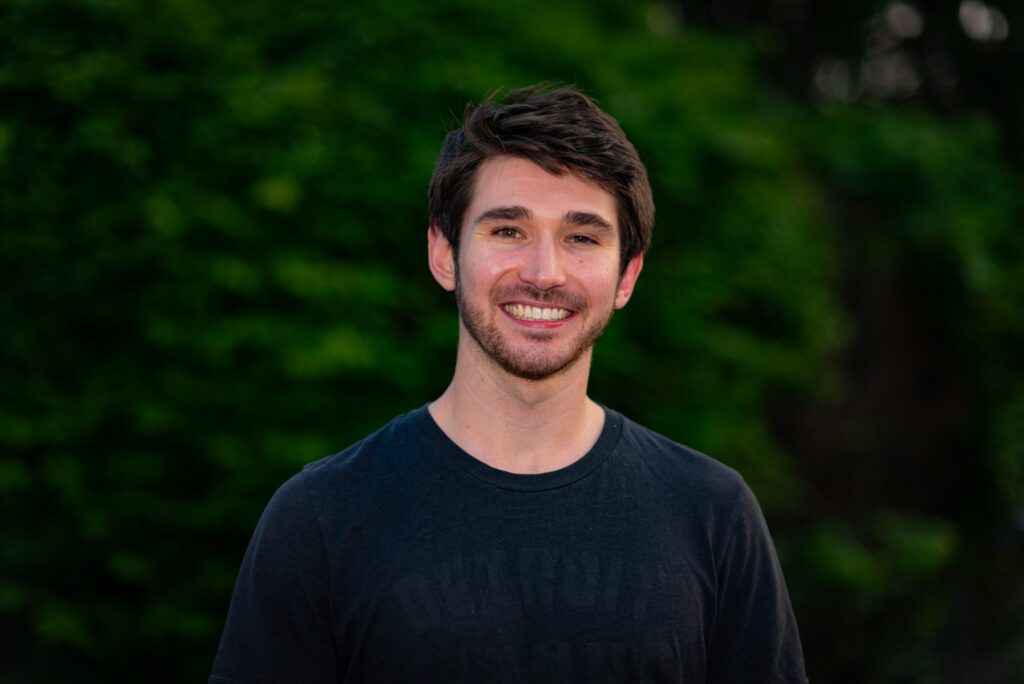
Sam Pigott, Class of 2021, has won the prestigious DocLand DocPitch Award presented by the California Film Institute. The $45,000 award goes toward additional production of his documentary, “How to Get Away with Greenwashing.” The film asks an important question: who gets to decide what ‘saving the environment’ looks like?
“As a biologist and first-time filmmaker, I am driven by a commitment to exposing the hidden costs of conservation,” says Pigott. He seeks to expose greenwashing, a practice in which companies and nonprofits claim to be more eco-friendly than they actually are in order to boost profits and funds — frequently at the expense of local and indigenous communities.
“My work is grounded in the belief that environmental protection must be democratic — centered on the voices of those who live closest to the land. This film grew from research spent studying the intersection of ecology and human rights.”
In April 2025, Pigott and his team were announced as one of five finalists to compete at the DocLands festival in the San Francisco Bay Area of California. Among the competition were several Oscar, Emmy and Sundance winning filmmakers. Despite the tough competition, Pigott’s team earned the most votes for the Audience Choice Award.
“I like to think that this win is an indicator of the potential of this film to resonate with diverse audiences and engage in pressing issues,” Pigott said. “While this award is a much-needed financial boost for us, more than anything I hope our success at DocLands shows other institutions that we have a project worthy of support, a project that people want to see.”
The film focuses on a region of Chile that has a high number of large private nature reserves and an ever-increasing rate of violence against environmental defenders. “At the center of this film is this contradiction. How can these two things exist at the same time and in the same place?” says Pigott. The film delves into stories of dispossession, indigenous rights, Chile’s economic and political history and accountability in international science.
“While our film focuses on difficult issues, ultimately it is a story of people seeking a better way to live, people with a different vision for the socioeconomic development of their home,” Pigott explains.
“Growing up in the rustbelt of America, I witnessed how corporate power can devastate local landscapes and livelihoods,” said Pigott. “That experience informs my investigation into the private conservation industry — a system that mirrors global patterns of land privatization and environmental injustice. My scientific background allows me to critically examine the ecological impacts, while my personal history fuels a commitment to elevating the voices of those resisting exploitation.”
It was during a trip for Earlham’s Tibetan Studies Program that he first taught himself how to use a camera and make a documentary, recording a five-day trek through the Himalayan mountains with other students in the program. From there, he went on to earn a Watson Fellowship on the way to graduating from Earlham with a Bachelor of Arts in Biology. It was during completion of the Watson Fellowship that work on “How to Get Away with Greenwashing” began.
“This documentary blends investigative journalism, personal testimony, and archival research to reveal the systemic forces driving ecological and human harm,” he said in a recent interview with DocLands. “More than an exposé, it is a call to reimagine conservation — one rooted in equity, dignity, and collective power.”
Since the documentary is not yet completed, Pigott is hopeful for further financial backing to finish the film. “Right now, we’re about a third of the way through with filming,” he says. “Money is really what is holding us back. We are ready to go but $45,000 only goes so far. Our hope is that the attention we’ve generated from DocLands may help us gain the attention of an executive producer, a studio or foundation looking to support an impact driven documentary,” he says. “Personally, I’d love to see that support come from within the Earlham community.”
Readers who are curious to learn more about or support the project can visit the DocLands website and reach out to Pigott directly at [email protected]
Written by Jay Kibble, writer/editor for Earlham College Office of Marketing and Communications
***
About Earlham College
Earlham College and Earlham School of Religion foster a collaborative learning community that inspires and motivates students with transformative opportunities and experiences so they can become catalysts for good in a changing world. Located in Richmond, Indiana, Earlham is one of U.S. News & World Report’s Top 75 national liberal arts colleges and offers one of the top 20 classroom experiences in the nation, according to the Princeton Review.
Media contact
Brian Zimmerman
Assistant vice president of marketing and communications
Email: [email protected]
Phone: 765.983.1256